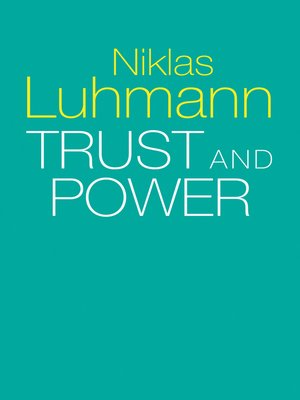
Sign up to save your library
With an OverDrive account, you can save your favorite libraries for at-a-glance information about availability. Find out more about OverDrive accounts.
Find this title in Libby, the library reading app by OverDrive.



Search for a digital library with this title
Title found at these libraries:
| Library Name | Distance |
|---|---|
| Loading... |
In this important book, Niklas Luhmann uses his powers as an analyst of the social system to examine two of the most important concepts which hold that system together and allow it to evolve: trust and power. He criticises those theoretical accounts whose roots lie in what he refers to as ideologies – accounts which use implicit beliefs in particular conceptions of human nature to explain and predict social action in a one-dimensional way. Theories of rational choice and moralistic explanations are taken to task, as are the theories of both Marx and Habermas. Luhmann's unique scientific sociology underpins every page and enables him to highlight the potential shortcomings of these narrative approaches. Underlying this approach is the idea that ideologically-based social theory, whether critical or conservative, is unable to do justice to the complexities existing within the parameters of social systems, individuals, and the interactions between them. He aims to show instead how only a painstaking systems analysis can capture these intricacies.
Although written over 40 years ago, Luhmann's complex vision of the operations of trust and power provides a wealth of insights of considerable value to scholars and students grappling with contemporary social and economic problems. The editors' introduction to this new edition and the significant revisions they have made to the translation will help to reveal the richness and clarity of this vision and its relevance to the ways that trust and power operate in today's society.
Although written over 40 years ago, Luhmann's complex vision of the operations of trust and power provides a wealth of insights of considerable value to scholars and students grappling with contemporary social and economic problems. The editors' introduction to this new edition and the significant revisions they have made to the translation will help to reveal the richness and clarity of this vision and its relevance to the ways that trust and power operate in today's society.







